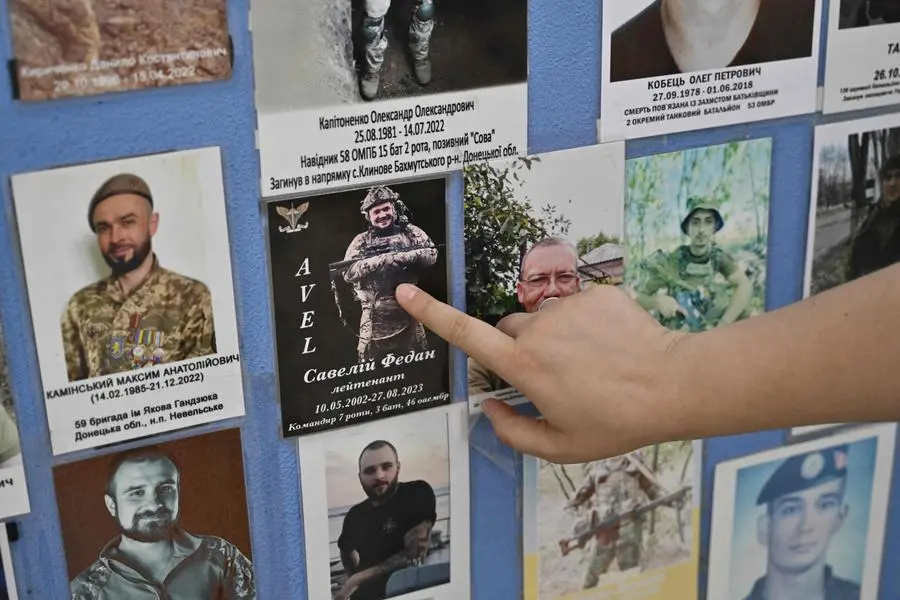PHOTO
Twenty-year-old Erika Martyniuk only had five days together with her newly-wed husband before he was killed fighting Russian forces in southern Ukraine.
She identified the remains of 21-year-old Saveliy Fedan, whose face was disfigured by fatal wounds, through his tattoos.
"When I saw photos of his body in the morgue, it felt like I was dead too," Erika told AFP at a park in Kyiv.
Erika's story is not uncommon in Ukraine, where young people widowed by the war begin their adult life in mourning.
Erika and Saveliy met in summer camp when they were still teenagers.
After drifting apart, they reconnected a few years later and began a relationship in March 2022, shortly after the war began.
The invasion pushed them to make things official.
Scared of losing each other, Erika said she got married to Saveliy one day before he was deployed in February 2023.
"Our main dream," she said, "was to have at least one quiet day when we could not think about the war, about the fact that we'll wake up tomorrow and he'll have to leave again."
He survived the brutal battle of Bakhmut but was killed at the end of August in the southern region of Zaporizhzhia.
Since then, Erika said she had "no more goals, no more dreams."
Wearing Saveliy's old army bag over her shoulder, she gently places a Ukrainian flag at the foot of a memorial wall adorned with the faces of fallen soldiers.
On her T-shirt reads the words: "Be a warrior, live forever".
- 'In pain for a long time' -
Erika said she couldn't stand the relative normality of Ukraine's capital Kyiv, where residents have adapted to frequent air raids.
"People walk around, laugh, plan parties. And I go to the cemetery," she said.
She could only relate to other women who had also lost their partners.
"They tell it like it is: 'it won't be easy, you'll be in pain for a very long time and you won't know what to do'," she said.
The number of young widows is hard to estimate.
Ukraine has not disclosed how many soldiers have died at the front.
Oksana Borkun, who created an online community for women who lost their partners or husbands, calculated that 18 to 24 year-olds make up 7 percent of the 2,000 members of her Facebook group.
She told AFP the relatives of young widows often diminish their grief when trying to console them.
"They tell them things like: 'you're still young, you'll find someone else', or even push them to meet other people," Borkun said.
The women often shut down in response.
And they are more at risk of sinking "into total despair" than their elders, she said.
"Older women have children, tasks to get done, a job. Something to hold onto... young girls completely collapse."
- 'Come back soon' -
Since losing her husband, 21-year-old English teacher Daryna Voyevodina said she was "struggling to maintain social contacts".
She said she only felt comfortable at the school where she works.
On her arm is a tattoo of Stitch -- the extra-terrestrial Disney character, and the call-sign of her late husband Igor.
Igor Voyevodin became a sniper shortly after the invasion began, despite his family's attempts to dissuade him.
The former Japanese philology student died on August 20, less than a month after marrying Daryna.
"I keep thinking that he's just busy, that he's going to come back soon," she said, trying to hide her shaking hands.
"This war is a huge blow to our generation," she added.
She vowed to make good on their dream to get a house by the sea and a nice car.
But the future looked bleak to her.
"After the war, we are going to have a lot of problems because the best and most motivated people will have been killed," she said.
Erika said she hoped to save lives as a combat paramedic.
"Maybe I'll be able to save someone else," she said.
Her 22-year-old friend Katya came to pick her up from her interview with AFP.
Two days prior, Katya's own fiancee was killed in combat.
The two girls had to prepare for his funeral the next day.
"So many guys are dying and nothing changes," Erika said. "How long will it last?"





















